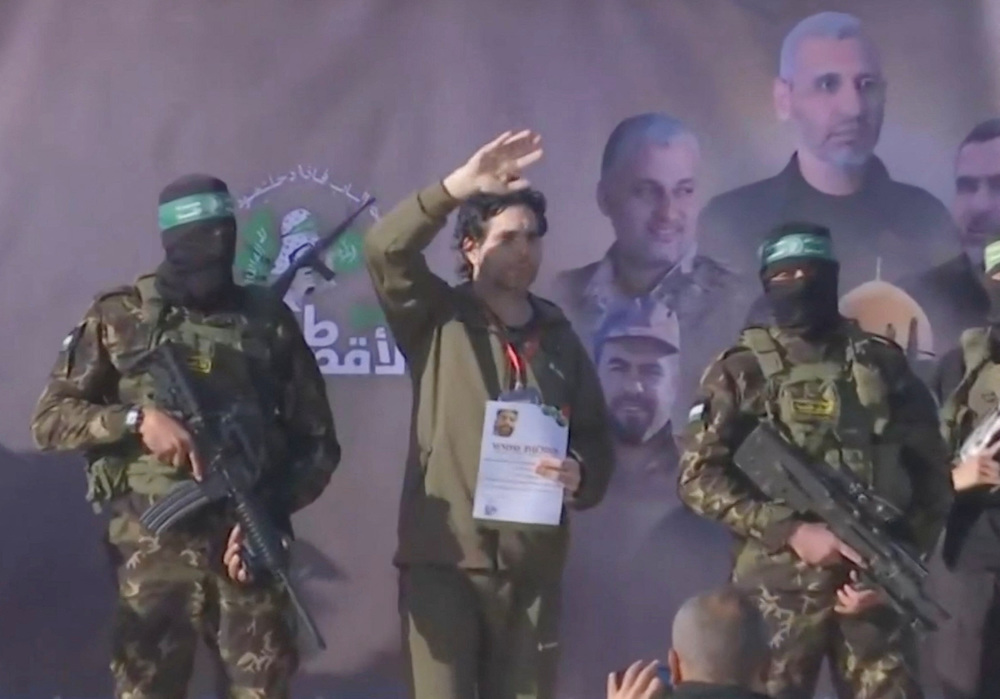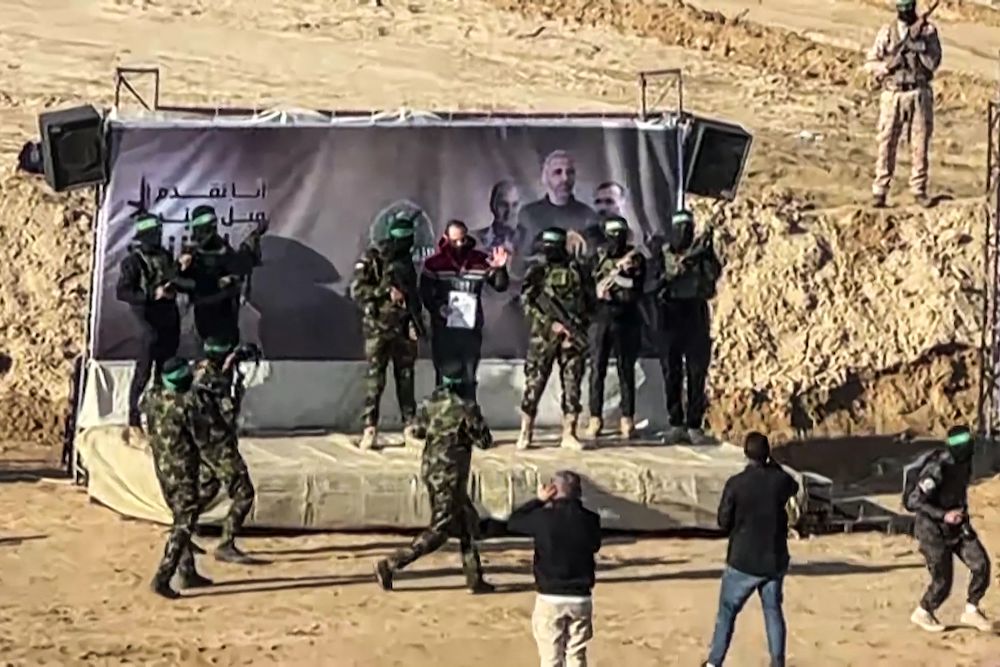DUBAI/BEIRUT: Iran’s Supreme Leader Ayatollah Ali Khamenei warned Hezbollah leader Hassan Nasrallah to flee Lebanon days before he was killed in an Israeli strike and is now deeply worried about Israeli infiltration of senior government ranks in Tehran, three Iranian sources said.
In the immediate aftermath of the attack on Hezbollah’s booby-trapped pagers on Sept. 17, Khamenei sent a message with an envoy to beseech the Hezbollah secretary general to leave for Iran, citing intelligence reports that suggested Israel had operatives within Hezbollah and was planning to kill him, one of the sources, a senior Iranian official, told Reuters.
The messenger, the official said, was a senior Iranian Revolutionary Guards commander, Brig. Gen. Abbas Nilforoushan, who was with Nasrallah in his bunker when it was hit by Israeli bombs and was also killed.
Khamenei, who has remained in a secure location inside Iran since Saturday, personally ordered a barrage of around 200 missiles to be fired at Israel on Tuesday, a senior Iranian official said. The attack was retaliation for the deaths of Nasrallah and Nilforoushan, the Revolutionary Guards said in a statement.
The statement also cited the July killing of Hamas Leader Ismail Haniyeh in Tehran, and Israel’s attacks on Lebanon. Israel has not claimed responsibility for Haniyeh’s death.
Israel on Tuesday began what it labelled as a “limited” ground incursion against Hezbollah in southern Lebanon.
Iran’s foreign ministry and the office of Israel’s Prime Minister Benjamin Netanyahu, which oversees the country’s foreign intelligence agency Mossad, did not reply to requests for comment.
Nasrallah’s assassination followed two weeks of precise Israeli strikes that have destroyed weapons sites, eliminated half of Hezbollah’s leadership council and decimated its top military command.
Iran’s fears for the safety of Khamenei and the loss of trust, within both Hezbollah and Iran’s establishment and between them, emerged in the conversations with 10 sources for this story, who described a situation that could complicate the effective functioning of Iran’s Axis of Resistance alliance of anti-Israel irregular armed groups.
Founded with Iran’s backing the 1980s, Hezbollah has long been the most formidable member of the alliance.
The disarray is also making it hard for Hezbollah to choose a new leader, fearing the ongoing infiltration will put the successor at risk, four Lebanese sources said.
“Basically, Iran lost the biggest investment it had for the past decades,” said Magnus Ranstorp, a Hezbollah expert at the Swedish Defense University, of the deep damage caused to Hezbollah that he said diminished Iran’s capacity to strike at Israel’s borders.
“It shook Iran to the core. It shows how Iran is deeply infiltrated also: they not only killed Nasrallah, they killed Nilforoushan,” he said, who was a trusted military adviser to Khamenei.
Hezbollah’s lost military capacity and leadership cadre might push Iran toward the type of attacks against Israeli embassies and personnel abroad that it engaged in more frequently before the rise of its proxy forces, Ranstorp said.
IRAN MAKES ARRESTS
Nasrallah’s death has prompted Iranian authorities to thoroughly investigate possible infiltrations within Iran’s own ranks, from the powerful Revolutionary Guards to senior security officials, a second senior Iranian official said. They are especially focused on those who travel abroad or have relatives living outside Iran, the first official said.
Tehran grew suspicious of certain members of the Guards who had been traveling to Lebanon, he said. Concerns were raised when one of these individuals began asking about Nasrallah’s whereabouts, particularly inquiring about how long he would remain in specific locations, the official added.
The individual has been arrested along with several others, the first official said, after alarm was raised in Iran’s intelligence circles. The suspect’s family had relocated outside Iran, the official said, without identifying the suspect or his relatives.
The second official said the assassination has spread mistrust between Tehran and Hezbollah, and within Hezbollah.
“The trust that held everything together has disappeared,” the official said.
The Supreme Leader “no longer trusts anyone,” said a third source who is close to Iran’s establishment.
Alarm bells had already rung within Tehran and Hezbollah about possible Mossad infiltrations after the killing in July of Hezbollah commander Fuad Shukr in an Israeli airstrike on a secretive Beirut location while meeting an IRGC commander, two Hezbollah sources and a Lebanese security official told Reuters at the time. That killing was followed a few hours later by the assassination of Hamas leader Haniyeh in Tehran.
Unlike Haniyeh’s death, Israel publicly claimed responsibility for the killing of Shukr, a low-profile figure who Nasrallah nonetheless described, at his funeral, as a central figure in Hezbollah’s history who had built its most important capabilities.
Shukr was key to the development of Hezbollah’s most advanced weaponary, including precision-guided missiles, and was in charge of the Shiite groups operations against Israel over the past year, Israel’s military has said.
Iranian fears about Israeli penetration of its upper ranks stretches back years. In 2021, former Iranian president Mahmoud Ahmadinejad said the head of an Iranian intelligence unit that was supposed to target agents of Mossad had himself been an agent for the Israeli spy agency, telling CNN Turk that Israel obtained sensitive documents on Iran’s nuclear program, a reference to a 2018 raid in which Israel obtained a huge trove of top secret documents about the program.
Also in 2021, Israel’s outgoing spy chief Yossi Cohen gave details about the raid, telling the BBC that 20 non-Israeli Mossad agents were involved in stealing the archive from a warehouse.
PAGER WARNING
Khamenei’s invitation to Nasrallah to relocate to Iran came after thousands of pagers and walkie talkies used by Hezbollah blew up in deadly attacks on Sept 17 and 18, the first official said. The attacks have been widely attributed to Israel, although it has not officially claimed responsibility.
Nasrallah, however, was confident in his security and trusted his inner circle completely, the official said, despite Tehran’s serious concerns about potential infiltrators within Hezbollah’s ranks.
Khamenei tried a second time, relaying another message through Nilforoushan to Nasrallah last week, imploring him to leave Lebanon and relocate to Iran as a safer location. But Nasrallah insisted on staying in Lebanon, the official said.
Several high-level meetings were held in Tehran following the pager blasts to discuss Hezbollah and Nasrallah’s safety, the official said, but declined to say who attended those meetings.
Simultaneously, in Lebanon, Hezbollah began conducting a major investigation to purge Israeli spies among them, questioning hundreds of members after the pager detonations, three sources in Lebanon told Reuters.
Sheikh Nabil Kaouk, a senior Hezbollah official, was leading the investigation, a Hezbollah source said. The probe was progressing rapidly, the source said, before an Israeli raid killed him a day after Nasrallah’s assassination. Another raid earlier last week had targeted other senior Hezbollah commanders, some of who were involved in the inquiry.
Kaouk had summoned for questioning Hezbollah officials involved in logistics and others “who participated, mediated and received offers on pagers and walkie-talkies,” the source said.
A “deeper and comprehensive inquiry” and purge were now needed after the killing of Nasrallah and other commanders, the source said.
Ali Al-Amin, the editor-in-chief for Janoubia, a news site based that focuses on the Shiite community and Hezbollah said reports indicated that Hezbollah detained hundreds of people for questioning after the pagers saga.
Hezbollah is reeling from Nasrallah’s killing in his deep bunker in a command HQ, shocked at how successfully Israel penetrated the group, seven sources said.
Mohanad Hage Ali, deputy research director of the Carnegie Middle East Center in Beirut with a focus on Iran and Hezbollah, described the offensive as “the biggest intelligence infiltration by Israel” since Hezbollah was founded with Iran’s backing in the 1980s.
The current Israeli escalation follows almost a year of cross-border fighting after Hezbollah began rocket attacks in support of its ally Hamas. The Palestinian group killed 1,200 people and seized 250 hostages in an attack on Israel on Oct. 7, 2023, according to Israeli tallies.
In Gaza, Israel’s retaliation has killed more than 41,000 Palestinians, according to the Gaza health ministry.
LOSS OF TRUST
The Israeli offensive and fear of more attacks on Hezbollah have also prevented the Iranian-backed group from organizing a nationwide funeral on a scale reflecting Nasrallah’s religious and leadership status, according to four sources familiar with the debate within Hezbollah.
“No one can authorize a funeral in these circumstances,” one Hezbollah source said, lamenting the situation in which officials and religious leaders could not come forward to properly honor the late leader.
Several commanders killed last week were buried discreetly on Monday, with plans for a proper religious ceremony when the conflict ends.
Hezbollah is mulling the option of securing a religious decree to bury Nasrallah temporarily and hold an official funeral when the situation permits, the four Lebanese sources said.
Hezbollah has refrained from officially appointing a successor to Nasrallah, possibly to avoid making his replacement a target for an Israeli assassination, they said.
“Appointing a new Secretary General could be dangerous if Israel assassinates him right after,” said Amin. “The group can’t risk more chaos by appointing someone only to see them killed.”






























